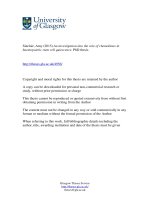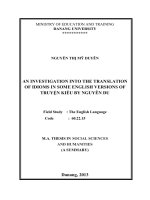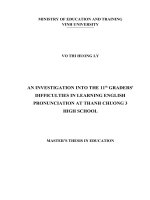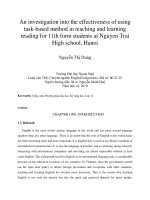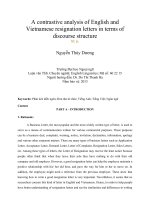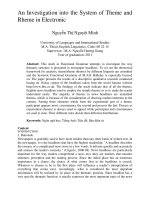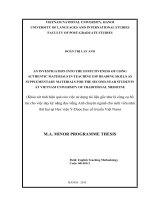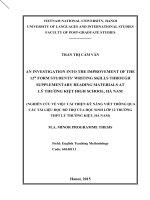Ethical perception of accounting program graduates, an investigation into the mandated AICPA curriculum change
Bạn đang xem bản rút gọn của tài liệu. Xem và tải ngay bản đầy đủ của tài liệu tại đây (590.23 KB, 136 trang )
ETHICAL PERCEPTION OF ACCOUNTING PROGRAM GRADUATES: AN
INVESTIGATION INTO THE MANDATED AICPA CURRICULUM CHANGE
by
Nicholas John Koumbiadis
A Dissertation Presented in Partial Fulfillment
of the Requirements for the Degree
DOCTOR OF BUSINESS ADMINISTRATION
UNIVERSITY OF PHOENIX
February 2011
UMI Number: 3467479
All rights reserved
INFORMATION TO ALL USERS
The quality of this reproduction is dependent upon the quality of the copy submitted.
In the unlikely event that the author did not send a complete manuscript
and there are missing pages, these will be noted. Also, if material had to be removed,
a note will indicate the deletion.
UMI 3467479
Copyright 2011 by ProQuest LLC.
All rights reserved. This edition of the work is protected against
unauthorized copying under Title 17, United States Code.
ProQuest LLC
789 East Eisenhower Parkway
P.O. Box 1346
Ann Arbor, MI 48106-1346
iv
ABSTRACT
Corporate scandals in the late 90s and early this century led to a decline in the
public’s trust of the accounting profession. Since that time, the government, companies,
and universities have attempted to rebuild that trust through a number of methods, such
as passing laws requiring better regulation and more disclosure as well as requiring
improved ethics education for future accountants. It is this latter issue that is the focus of
this study. The purpose is to examine students who have recently graduated from the
standard 120 credit accountancy program and compare and contrast their ethical
perceptions with students who have recently graduated from the AICPA-mandated 150
credit accountancy program which includes 30 extra credits with a focus on ethics.
Recently graduated accounting students from selected Association to Advance Collegiate
Schools of Business (AACSB) were asked to fill out a cross-sectional survey based on
Victor and Cullen’s (1988) Ethical Climate Questionnaire (ECQ) to determine whether a
difference exists between the two groups’ ethical perceptions. The nine hypotheses
derived from the ECQ were tested using an independent sample t-test and Levene’s test
for the homogeneity of the variances between the two groups. Compared with graduates
of the 120 credit program, 150 credit program graduates scored significantly higher in
ethical perceptions on five domains: Company Profit, Friendship, Team Interest,
Personal Morality, and Rules, when testing at a confidence level of 95%. The two groups
were not significantly different in the domains of Self-Interest, Efficiency, Social
Responsibility, or Laws. This study is part of a growing body of research on ethics in
accounting and this project will contribute to future research on similar topics
v
DEDICATION
This work is first dedicated to my Lord and Savior Jesus Christ. For in Him I live
and move, and have my being. Secondly, this work is dedicated to my beautiful wife
Janice, and my three lovely children John, Julia, and Gabrielle for their patience, love,
and continued support throughout my journey in completing my doctoral dissertation. My
wife made many sacrifices and is the main reason why I have gone so far. I will never
cease to appreciate my wife and children daily.
Also, I dedicate this work to my parents John and Irene and my sister Popi who
have showed me unconditional love and support through the most difficult times in my
life. I will always remember my family how they believed in me.
vi
ACKNOWLEDGMENTS
I have been on this long journey for quite some time and I am beholden to many.
First, I am indebted to my mentor of my committee, Dr. John Parham, for his continued
patience, advice, encouragement, and his attention to detail throughout the whole process
of writing a doctoral dissertation. I also want to thank the other committee members, Dr.
John Okpara and Dr. Brian Sloboda for their knowledge and recommendations.
It would be an unfair if I did not take this moment to acknowledge my colleague
and my friend, Dr. John Okpara. Dr. Okpara, I really appreciate your friendship and your
commitment to seeing me develop as a doctoral student. Your wisdom and support is
greatly appreciated and I want you to know that you will always remain dear to my heart.
I also want to acknowledge two administrative individuals, Misa Alexander and
David Grigorieff for their patience and continuous support and encouragement from the
beginning to the end of my studies. You both have communicated timely information and
kept me well informed of the policies and procedures of the University. Above all, you
treated me with professional care, courtesy, and understanding throughout the entire
process.
Finally, I am so grateful to my wife Janice for her support, patience, and sacrifice
during the writing for my doctoral dissertation. I will always love and cherish my
commitment to her and my family all the days of my life.
vii
TABLE OF CONTENTS
LIST OF TABLES ........................................................................................................ xi
LIST OF FIGURES ...................................................................................................... xii
CHAPTER 1: INTRODUCTION ....................................................................................... 1
Background..................................................................................................................... 3
Problem Statement.......................................................................................................... 6
Purpose Statement .......................................................................................................... 7
Significance of the Study.............................................................................................. 10
Methods ........................................................................................................................ 11
Research Questions ...................................................................................................... 13
Theoretical Framework ................................................................................................ 15
Ethical Theory .......................................................................................................... 15
Kohlberg’s Theory ................................................................................................... 16
Views of Ethical Behavior ........................................................................................ 17
Ethics in Post-Secondary Education ........................................................................ 18
Scope ............................................................................................................................ 20
Limitations.................................................................................................................... 20
Chapter Summary ......................................................................................................... 21
CHAPTER 2: REVIEW OF THE LITERATURE ........................................................... 24
Historical Perspectives ................................................................................................. 25
Cognitive Moral Reasoning .......................................................................................... 27
Opposing Views........................................................................................................ 28
Contributions to Kohlberg’s Theory............................................................................. 29
Defining Issues Test ................................................................................................. 29
viii
Victor and Cullen’s Ethical Climate ............................................................................. 30
Egoism ...................................................................................................................... 33
Benevolence.............................................................................................................. 35
Principle ................................................................................................................... 37
Locus of Analysis ......................................................................................................... 38
Morality .................................................................................................................... 40
Self Values ................................................................................................................ 42
Efficiency Teaching Ethics ....................................................................................... 42
Social Responsibility ................................................................................................ 44
Friendship and Team Interest .................................................................................. 45
Business Ethics and Legislation and Rules .............................................................. 46
Company Rules and Procedures .............................................................................. 48
Ethics and Accounting Curriculum .............................................................................. 50
CHAPTER 3: METHODS ................................................................................................ 54
Research Design ........................................................................................................... 54
Research Methods and Design Appropriateness .......................................................... 55
Sample and Procedures................................................................................................. 56
Consent, Confidentiality, and Geographic Location .................................................... 59
Consent..................................................................................................................... 59
Confidentiality .......................................................................................................... 60
Geographical Location ............................................................................................ 60
Data Collection Procedures and Rationale ............................................................. 61
Instrumentation ............................................................................................................. 62
Measure of Variables ............................................................................................... 63
Reliability and Validity ................................................................................................ 64
ix
Data Analysis................................................................................................................ 65
Chapter Summary ......................................................................................................... 66
CHAPTER 4: RESULTS AND DISCUSSION ................................................................ 67
Descriptive Characteristics ........................................................................................... 67
Sample Distribution ................................................................................................. 67
Findings ........................................................................................................................ 70
Factor Analysis ........................................................................................................ 70
Hypotheses Testing................................................................................................... 72
Summary of Findings ................................................................................................... 83
CHAPTER 5: CONCLUSIONS AND RECOMMENDATIONS .................................... 85
Discussion of the Statistical Results, their Significance, and Limitations ............... 85
How the Results Fit with the Existing Literature ..................................................... 88
Implications for Accounting Education Policy ........................................................ 93
Recommendations for Future Research ................................................................... 94
REFERENCES ................................................................................................................. 98
APPENDIX A: KOHLBERG’S LEVELS AND STAGES OF COGNITIVE MORAL
DEVELOPMENT ........................................................................................................... 116
APPENDIX B: OFFICE OF THE PROFESSIONS NEW YORK EDUCATION
DEPARTMENT: LICENSE REQUIREMENT.............................................................. 117
APPENDIX C: ETHICAL CLIMATE QUESTIONNAIRE .......................................... 118
APPENDIX D: SIGNED PERMISSION TO USE AN EXISTING SURVEY-ECQ .... 121
APPENDIX E: INFORMED CONSENT FOR PARTICIPANTS 18 YEARS OF AGE
AND OLDER ................................................................................................................. 122
x
APPENDIX F: FACTOR ANALYSIS ........................................................................... 123
APPENDIX G: DEMOGRAPHIC QUESTIONS .......................................................... 124
xi
LIST OF TABLES
Table 1: Theoretical Ethical Climate Types ....................................................... 32
Table 2: Ethical Climate Types of the Locus of Analysis .................................. 39
Table 3: Sample Size Determination .................................................................. 57
Table 4: Questionnaire Response Summary ....................................................... 68
Table 5: Demographic Characteristics of Respondents (N=286) ....................... 70
Table 6: Variable Means and Standard Deviations of both accounting programs
............................................................................................................................. 73
Table 7: Independent Sample Test-Self-Interest, Company Profit, and Efficiency
............................................................................................................................. 74
Table 8: Independent Sample Test-Friendship, Team Interest, and Social
Responsibility ..................................................................................................... 77
Table 9: Independent Sample Test-Personal Morality, Rules, and Laws .......... 80
xii
LIST OF FIGURES
Figure 1. STUDY VARIABLES FROM THE ITEMS FOUND IN THE DQ AND ECQ.
.......................................................................................................................................... 55
Figure 2. THE SUM OF THE CONFIRMED HYPOTHESES USING THE ETHICAL
CLIMATE TYPES PRECURSOR ON PROGRAM.. ...................................................... 84
1
CHAPTER 1: INTRODUCTION
In the early 2000s, negative publicity caused by the Enron scandal, which led to
the bankruptcy of Enron and the demise of accounting firm Arthur Andersen, may have
affected the public perception of the accounting profession (Zabihollah, 2004). In a 2002
Gallup poll, positive ratings of accounting professions fell 47% to 31% and negative
ratings increased from 8% to 31% after the Enron scandal (AICPA, 2005). In the
aftermath of Enron/Arthur Anderson and other accounting scandals (Adelphia
Communications, Dynegy, WorldCom, Tyco), several measures including the SarbanesOxley (SOX) Act of 2002 were put in place to prevent misdeeds by public accountants.
These events have also increased interest in the moral reasoning of public
accountants. A study by Rau and Weber (2004) examined whether the Enron event had
heightened auditors’ moral reasoning, measured by the perceived moral intensity
embedded in ethical dilemmas they faced. Results showed that auditors’ awareness of
moral reasoning increased significantly after the scandal (Koumbiadis, Okpara, 2008;
Dellaportas, 2006; Titard, 2004; Esmond-Kiger, 2004). The commitment and subsequent
discovery of some accountants’ unethical behaviors also resulted in the modification of
the number of requirements in the accounting curriculum in post-secondary institutions
by the American Institute of Certified Public Accountants (AICPA). To improve the
level of professional responsibility and ethics, changes in post-secondary instruction were
imminent (Desplaces, Melchar, Beauvais, & Bosco, 2007; Mantzke, Carnes, & Tolhurst,
2005). However, a review of relevant literature revealed that little research had been
conducted on the effectiveness of the AICPA-mandated curriculum change in bettering
2
students’—and thereby future accountants’—views of ethics and professional
responsibility (Ritter, 2006; Taylor & Rudnick, 2005).
Accounting curriculum revisions by the AICPA included the addition of the 150
credit rule, which has been adopted by 40 states (Allen & Woodland, 2006; De Barry,
2003; Taylor & Rudnick, 2005). According to the New York State Education
Department (NYSED), the 150 credit rule required accounting students to complete
courses in ethics and professional responsibility in order to qualify to take the Certified
Public Accountant (CPA) exam (see Appendix A). Accounting students could still enroll
in a 120 credit accounting program; however, upon finishing this, they would not be
qualified to sit for the CPA exam.
Some experts have raised concerns regarding the effectiveness of this curriculum
change and whether it is needed (Bierstaker, Howe, & Seol, 2005). The AICPA’s
ultimate goal with the 150 credit rule was to increase the quality of work produced by
accountants given that the business world environment is often changing (AICPA, 2010).
The quality of public accountants’ work is dependent upon the demand for ethical
accounting, auditing, and assurance services evidenced by financial reporting (Allen &
Woodland, 2006; Carpenter & Stephenson, 2006).
The changes elicited by the AICPA reflected a growing interest in the ethical
perceptions of newly graduated accounting students (Reckers, 2006). However, it was
unclear as to whether perceptions of ethical reasoning differed between accounting
graduates in the 150 credit program compared to those in the 120 credit program. The
purpose of this study, therefore, was to determine the efficacy of the new 150 credit
program and if it achieved the desired results. The study used Kohlberg’s (1968) theory
3
on moral development and cognitive moral reasoning as a theoretical framework. Newly
graduated accounting students from selected colleges in New York State were surveyed
using a questionnaire developed by Victor and Cullen (1988), which was based on
Kohlberg’s (1968) theory on moral development and cognitive moral reasoning. Newly
graduated accounting students were defined in this study as those who graduated from
either of the two accounting programs in the last two years. Chapter 1 provides
background of the problem and the purpose of this study.
Background
Unethical behaviors among public accountants prompted a revision in postsecondary education for accounting majors (Earley & Kelly, 2004). The downfall of
some large companies also led to more demands on ethical conduct in the accounting
profession (Puxty, Sikka, & Willmott, 1994). Ethical decision making, the new 150
credit requirement, compliance with the Sarbanes-Oxley (SOX) Act of 2002, and an
increase in professional responsibility within the field of professional accountancy were
among the demands encountered by graduating accounting students as well as the
business schools they attended (Malone, 2006). Koestenbaum, Keys, and Weirich (2005)
suggested that a reason why today’s accountants may have succumbed to unethical
practices was that the business schools “often teach that money always comes before
ethics” (p.13).
Research conducted by several business schools revealed that the labor market for
newly graduated accounting students who sought to become CPAs put more demands on
the profession due to the unethical acts performed by some public corporations (Allen &
Woodland, 2006; Harrington & Moussalli, 2005). Koestenbaum et al. (2005, p. 13)
4
reported that lack of confidence in financial reporting by accountants had been a
contributing factor in slowing U.S. capital markets. As a result of the unethical acts
performed by some public corporations, the latest government involvement for the
economy included new rulings that led to the passing of the Sarbanes-Oxley Act of 2002,
which addressed the current unethical behaviors by some corporate leaders and
independent accountants. One of the goals of SOX was to restore public confidence in
CPAs (Cunningham, 2006; Koestenbaum, et al., 2005). The Act allowed the Securities
and Exchange Commission (SEC) to require that publicly traded corporations comply
with stringent rules on financial reporting, including the issuing of financial statements.
It also enhanced white collar crime penalties and included several other provisions that
placed stringent conditions on publicly traded corporations. The first title of the SOX
Act established the Public Company Accounting Oversight Board (PCAOB).
The PCAOB’s task was to guard the public against unethical behavior of any
public accountants that may result in misrepresentation of financial information of
publicly traded companies (Coates, 2007; Whitley, 2006). The falsification of financial
statements from several accounting firms such as Enron created a lack of public, investor,
and economic confidence in CPAs (Rau & Weber, 2004). Consequently, the main
purpose of SOX in establishing the PCAOB was to restore public confidence in and
improve the ethical perceptions of CPAs (Carmichael, 2004).
Although a great deal of research on the study of ethical and moral development
among individuals was performed in earlier periods (Kohlberg, 1968; Rest, 1973; Victor
& Cullen, 1988), little research has been carried out regarding ethical perceptions of
newly graduated accounting students who satisfied the 150 credit rule (Molyneaux,
5
2004). Supporters of the 150 credit rule agreed that the additional credits in the 150
credit accounting curriculum generated a higher quality of students who were better
prepared ethically to enter the public sector compared with accounting students of the
past who took only 120 credits (Allen & Woodland, 2006). Moreover, Rezaee (1994)
suggested that the 150 credit rule improved students’ ethical perceptions and accounting
knowledge, allowing accounting majors to exercise due professional care as future CPAs.
Accountants have always played an essential role in ensuring that reported financial
information remains free from any material misstatements that may change a
stakeholder’s decision. If an individual has misled the public by falsifying financial
records, thereby departing from generally accepted accounting principles (GAAP) and
making an unethical decision, the results can be devastating, potentially causing the fall
of companies, the employees, and the economy (Guynn, 2005). Unethical behaviors of
some corporate officers and accountants have created situations in which financial
statements needed for important decisions lacked objective reporting. Because initially
the individual unethical employees did not bear the brunt of the blame for the
misperceptions, but rather the companies themselves were held ethically and legally
responsible, the ultimate effect of the unethical behavior greatly impacted both the
companies and in turn the economy (Guynn, 2005).
Referring to how easily the economy and players within it can be affected by
unethical behaviors, Guynn (2005, p. 387) provided details that shareholders lost
approximately $66 billion in market capitalization in the case of Enron and $177 billion
in the case of WorldCom. Throughout 2000, the International Accounting Standard
Board (IASB) revisited the global accounting standards as a result of the demise of some
6
publicly traded companies in the United States. The crumpling of some U.S.
corporations cost billions in losses and increased risk in the market for many stakeholders
(Kaplan, 2007; Tweedie & Seidenstein, 2005).
Stakeholders are interested in the views of accounting graduates because they will
be future leaders in accounting firms. An inquiry into the ethical perceptions of
accounting graduates supported the notion that more education could increase ethical
awareness and thereby avert future scandals (Myers, 2003).
Problem Statement
Publicly traded companies regularly release financial statements, which the public
depend upon to be both reliable and relevant. To ensure the reliability and relevance of
the statements, companies frequently employ CPAs to validate the companies’ financial
information (McFarland, 2005). Without reliable financial information, or even
perceived reliable information, users cannot rely on financial statements for making good
economic decisions, potentially resulting in widespread economic ramifications
(Molyneaux, 2004). During the late 1990s, some corporate executives and their
accountants, from companies such as Enron and Andersen, published some misleading
financial accounts (Titard, 2004; Esmond-Kiger, 2004).
The discovery of Enron's accounting fraud affected not only the company itself,
which declared bankruptcy soon after, but also, called into question the trustworthiness of
other companies. That led to the dissolution of companies such as Arthur Andersen,
which “forever altered the public’s view of the CPA” (Lindberg & Beck, 2004, p. 36),
and the public lost faith in the field of accounting as a whole (Rauterkus & Song, 2005).
The U.S. government responded to these events by creating the SOX Act, which set new,
7
stricter standards for all U.S. public companies and accounting firms (Brown, Stocks, &
Wilder, 2007; Earley & Kelley, 2004; Gene, 2005; McCuaig, 2006; Zabihollah, 2004).
To improve the ethical perceptions of new accounting students and prevent such
ethical violations, a new curriculum was created to increase the emphasis on ethics in the
classroom (Gaa & Thorne, 2004). However, the question was whether the addition of 30
credits mandated by the AICPA actually makes a difference in the ethical practices of
newly graduating accountants. Presently, no research is available related to the effect of
the 30 additional credits on the ethical perceptions of newly graduated accounting
students.
To explore this question, a quantitative research method was used, consisting of a
cross-sectional survey of newly graduated accounting students and statistical analysis of
the results. This population comprised two groups of accounting graduates: (a) those
who completed 120 credits, and (b) those who completed the newly mandated 150
credits.
Purpose Statement
The purpose of this study was to examine if a difference existed between the
ethical perceptions of newly graduated accounting students in the 120 credit program and
those in the AICPA-mandated 150 credit program in selected Association to Advance
Collegiate Schools of Business (AACSB) accredited colleges in New York. The
students’ ethical perceptions were measured via a cross-sectional survey using Victor and
Cullen’s (1988) Ethical Climate Questionnaire (ECQ), which was based on Kohlberg’s
(1969) theory of Cognitive Moral Development.
8
The ECQ has been used for ethical perception studies in the past in developed and
developing countries and was found to be a valid and reliable method of determining
people’s perceptions on ethics (Cullen, Parboteeah, &Victor, 2003; Dellaportas, 2006;
Earley & Kelly, 2004; Koumbiadis & Okpara, 2008). It was therefore selected for this
study to determine the graduate students’ ethical perceptions.
The key independent variable for this study was program type, with two levels:
the 120 credit program and the 150 credit program. The dependent variable was the
ethical perceptions of the accounting graduates from each of the programs, as measured
by the ECQ. The ECQ variables were: self-interest, friendship, personal morality,
company profit, team interest, company rules and procedures, efficiency, social
responsibility, and laws and professionalism. Information on these dependent variables
was derived from the Demographic Questionnaire (DQ), and the ECQ which measures
ethical perceptions. The demographic variables were: gender, GPA, knowledge of an
ethics course, knowledge of SOX and passing the CPA exam. (While not all demographic
variables were used in this particular study—which focused primarily on ethics courses
taken, and the passing of the CPA exam—the current knowledge would be
complemented by additional studies that look more closely at the other variables.) The
ECQ variables were: self-interest, friendship, personal morality, company profit, team
interest, company rules and procedures, efficiency, social responsibility, and laws and
professionalism. These variables were identified in the literature and had been used by
previous researchers in the study of ethics (Cullen, Parboteeah, &Victor, 2003;
Dellaportas, 2006; Earley & Kelly, 2004; Koumbiadis & Okpara, 2008). Descriptive
information about the sample (not used in the analysis) was derived from the
9
Demographic Questionnaire (DQ), including gender, GPA, knowledge of an ethics
course, knowledge of the SOX Act, and passing the CPA exam.
Using Kohlberg’s (1968) CMD as a foundation, this study explored the present
accounting program in post-secondary institutions and its affect on ethical reasoning.
Modifications to the educational requirements required that accounting graduates wishing
to take the CPA exam have 150 credits, up from the previous requirement of 120 credits
(Read, Raghunandan, & Brown, 2003). Incorporated in the 150 credit program was a set
of classes that combined financial statement analysis, professional ethics, and
professional responsibility (see Appendix B). Jones (2005, p. 48) defined “professional
ethics” as “the moral values that a group of people use to control the way they perform a
task or use resources.” The AICPA created a “set code of professional conduct for public
accountants,” which should be followed by each practicing accountant who has fulfilled
the goals of the AICPA’s mandated curriculum change (Read, Raghunandan, & Brown,
2003, p. 31).
The AICPA’s goal in expanding the educational requirements by 30 credits was to
improve the quality of graduating accounting students, in turn hoping to advance the
quality of work carried out by public accountants. As the business environment made
adjustments as a result of the unethical decision making of a few accountants, so may the
consequences of the demand for ethical accountants restore the public’s opinion in
accounting firms and auditing services. This study examined whether a difference
existed between the perceptions of ethics among students in the 150 credit accounting
program and those in the previous 120 credit program.
10
Significance of the Study
Public confidence in the CPA profession diminished following the aftermath of
several large corporate scandals (Esmond-Kiger, 2004; Koumbiadis & Okpara, 2008;
Lindberg & Beck, 2004; Mason, 1994). As a result, students at several universities took
the issues of ethics into their own hands by developing academic honor pledges and
codes of conduct (Smith, 2004). Additionally, Congress attempted to restore public
confidence in CPAs by enacting the Sarbanes-Oxley Act of 2002, and the AICPA
endorsed the 150 credit rule which it hoped would create higher quality students who
would later become accounting professionals. The AICPA believed that increasing the
number of credit hours from 120 to 150 would help future leaders in accounting be better
prepared. An understanding of how the changes by students themselves, by Congress,
and by the AICPA impacted the ethical perceptions of accounting graduates could be of
significant interest to decision makers in the area of financial information (Orin, 2008).
An investigation into the 150 credit rule revealed that little research had been
conducted on whether it has had any effect on the ethical perceptions of accounting
graduates (Ritter, 2006; Taylor & Rudnick, 2005). Therefore, the contribution of this
research could assist in bridging the gap between accounting theory and ethical
accounting practice (e.g., preparation of financial statement, tax returns, and other
financial reporting), educators, and training and development, and advance knowledge in
this area of inquiry in the field of ethics (Krebs, 2006; Jennings, 2004).
Significance of the Study on Leadership
This study was significant to leadership because it reported on the ethical values
of future accountants who will be in positions to lead the way in the area of financial
11
information. Leadership within the accounting profession may be influenced by the
changes to the profession instated by Congress and the AICPA to avert future scandals
like those that proved detrimental to both the economy and society (Chang & Yen, 2007).
Additionally, an inquiry into the ethical perceptions of accounting graduates may be able
to show that ethical awareness can be increased with education, and more importantly, it
may avert future scandals (Myers, 2003). As accounting graduates become future leaders
in the preparation and presentation of financial information, examining the graduates’
perceptions of ethics in light of the recent changes to the accounting curriculum and the
profession will inform efforts to improve tomorrow’s ethical leadership.
Methods
Data for this research were collected from two groups of accounting graduates:
(a) those who graduated from the 120 credit program during 2008 and 2009, and (b) those
who completed the AICPA 150 credit program during the same years. This program
included 30 additional credits that focused on ethics and professional responsibility (See
Appendix B). A questionnaire adapted from Kohlberg’s Theory of Moral Development
was used to determine the ethical perceptions of accounting graduates. Results will help
determine whether the new 150 credit rule provided a significant improvement in
students’ perceptions of ethics. Data collected from both groups of accounting graduates
were compared to determine whether significant differences existed between the two
groups.
A quantitative questionnaire was used in this study to explore whether measures
of ethical perceptions (dependent variables) of accounting graduates differed by program
12
type, 120 credits versus 150 credits (independent variable). This approach allowed for
the assessment or measurement of individual abilities (Creswell, 2005).
The questionnaire included Victor and Cullen’s Ethical Climate Questionnaire
(ECQ), which was based on Lawrence Kohlberg’s theory of cognitive development. The
purpose of the ECQ questionnaire was to find out if there was a difference between the
ethical perceptions of the 120 credit program graduates verses the 150 credit program
graduates. A cross-sectional analysis was used to “examine current attitudes, beliefs,
opinions, or practices” (Creswell, 2005, p. 356). According to Bush and Burns (2005),
cross-sectional studies are common in quantitative research and “are one-time
measurements, they are often described as snap-shots of the population” (p. 125). In
addition, a cross-sectional survey design is often used to “compare two or more
educational groups in terms of attitudes, beliefs, opinions, or practices” (Creswell, 2005,
p. 356). With this cross-sectional survey design, the study compared the newly graduated
accounting students who only completed 120 credits with accounting graduates who
completed 150 credits in order to determine whether a significant difference existed in
the level of ethics and public responsibility between these two groups of graduates.
Questionnaire respondents answered questions based on a Likert scale ranging
from 0 to 5, where 0 was completely false and 5 was completely true (See Appendix C).
Because the data were based on a numerical scale, a quantitative approach was used to
analyze results. Study participants included the two groups of accounting graduates,
those from the 120 credit program and those students who completed the newly mandated
AICPA 150 credit program at both public universities and private colleges in New York
State (NYS).
13
Samples of the two groups of graduates were randomly selected from alumni
directories of private and public universities located in NYS.
Research Questions
Each research question was based on the literature review and was found to be an
important contribution to the field of ethics (Cullen, Parboteeah, &Victor, 2003;
Dellaportas, 2006; Earley & Kelly, 2004; Koumbiadis & Okpara, 2008). The research
questions (RQs) provided a basis for establishing the hypotheses (Hs) for this research:
Main RQ: Do accounting graduates in the 150 credit program exhibit significantly
different perceptions on ethics than accounting graduates in the 120 credit
program?
Main H: Ethical perceptions of the two groups of accounting graduates will not be
significantly different.
RQ1: To what extent was ethical perception (Self-Interest) important to the two
groups of accounting graduates?
H1: Ethical perceptions (Self-Interest) will not be significantly different between
the two groups of accounting graduates.
RQ2: To what extent was ethical perception (Company Profit) important to the
two groups of accounting graduates?
H2: Ethical perceptions (Company Profit) will not be significantly different
between the two groups of accounting graduates.
RQ3: To what extent was ethical perception (Efficiency) important to the two
groups of accounting graduates?
